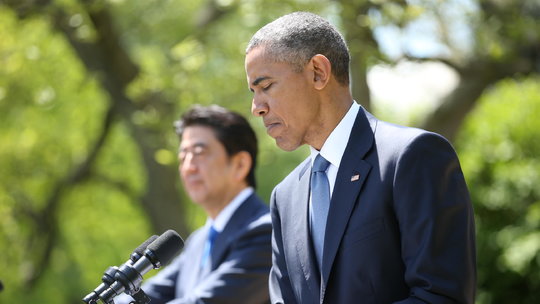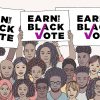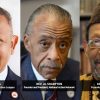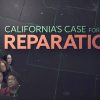By JULIE HIRSCHFELD DAVIS and MATT APUZZO

WASHINGTON — President Obama responded with passion and frustration on Tuesday to the violence that has rocked Baltimore and other cities after the deaths of young black men in confrontations with the police, calling for a period of soul-searching about what he said had become a near-weekly cycle of tragedy.
Speaking from the White House Rose Garden, Mr. Obama condemned the chaos unfolding just 40 miles north of the White House and called for “full transparency and accountability” in a Department of Justice investigation into the death of Freddie Gray, the young black man who died of a spinal cord injury suffered while in police custody.
He said that his thoughts were also with the police officers injured in Monday night’s unrest in Baltimore, which he said “underscores that that’s a tough job, and we have to keep that in mind.”
But in a carefully planned 14-minute statement during a news conference with Prime Minister Shinzo Abe of Japan, Mr. Obama made clear that he was deeply dismayed not only by the recent unrest in several cities but also by the longstanding yet little-discussed racial and societal forces that have fed it.
“We have seen too many instances of what appears to be police officers interacting with individuals, primarily African-American, often poor, in ways that raise troubling questions,” Mr. Obama said. “This has been a slow-rolling crisis. This has been going on for a long time. This is not new, and we shouldn’t pretend that it’s new.”
He spoke as Loretta E. Lynch, the new attorney general, dispatched two of her top deputies to Baltimore to handle the fallout: Vanita Gupta, her civil rights chief, and Ronald L. Davis, her community-policing director. The unrest there and the epidemic Mr. Obama described of troubled relations between white police officers and black citizens have consumed Ms. Lynch’s first two days on the job and could define her time in office.
They have also raised difficult and familiar questions for Mr. Obama about whether he and his administration are doing enough to confront the problem, questions made all the more poignant because he is the first African-American to occupy the White House.
The president struggled for balance in his remarks. He pushed back against critics who have said he should be more aggressive in his response to questionable practices by the police, saying: “I can’t federalize every police department in the country and force them to retrain.”
Mr. Obama also made clear that he had no sympathy for people rioting in the streets, calling them “a handful of people taking advantage of the situation for their own purposes,” who should “be treated as criminals.”
And he said that law enforcement officials and organizations that represent them must also admit that “there are some police who aren’t doing the right thing.”

But he emphasized that the problem went far beyond the police, who he said are too often deployed to “do the dirty work of containing the problems that arise” in broken urban communities where fathers are absent, drugs dominate and education, jobs and opportunities are nonexistent.
The president had initially avoided commenting on the unrest in Baltimore, allowing only still photographers into the Oval Office on Monday afternoon as he held an unscheduled meeting with Ms. Lynch, thus denying reporters the chance to ask him questions about the chaos then unfurling one state away. The issue dominated Ms. Lynch’s first day on the job, and her response to it will be watched closely. As he prepared to swear her in, Vice President Joseph R. Biden Jr. said that Ms. Lynch, the first black woman in the post, was uniquely qualified to bridge the divide between minority neighborhoods and police officers clashing over the use of deadly force. Within hours, Baltimore was in flames.
Ms. Lynch’s predecessor, Eric H. Holder Jr., the first black attorney general, was the face of the Obama administration’s response to unrest in Ferguson, Mo., last year after a white police officer killed an unarmed black teenager there, and he relished the opportunity to talk about policing and race relations.
It made him a hero of the civil rights movement, but drew sharp criticism from police groups who said the attorney general did not do enough to support them.
Ms. Lynch, a career prosecutor, came into office promising to strike a new tone and planned to visit police groups this summer. But the riots in Baltimore after the death of the 25-year-old Mr. Gray have overtaken that timeline. Almost as soon as she had taken her oath, there were signs that Baltimore was about to erupt.
As mourners gathered for Mr. Gray’s funeral, the police announced that three street gangs had pledged to work together to “take out” police officers. The University of Maryland shut down its Baltimore campus early, saying it had been warned that the area could soon turn violent.
Continue reading the main story Video

Play Video|1:58
Scenes From the Unrest in Baltimore
Scenes From the Unrest in Baltimore
A turbulent day in Baltimore ended with rioting by rock-throwing youths and a call to end the violence by religious leaders and the mother of Freddie Gray.
By Axel Gerdau on Publish Date April 28, 2015.
At the Justice Department, Ms. Lynch was met by Ms. Gupta and Mr. Davis for a lengthy update on Baltimore. It was her first meeting as attorney general, and it led to the unscheduled trip to the White House to meet with Mr. Obama.
In one meeting on Tuesday, Ms. Lynch told officials that while in Baltimore, they should meet not only Mr. Gray’s family but also the officers who were most seriously injured. “When officers get injured in senseless violence, they become victims as well,” she said, a Justice Department official told reporters.
As night set in on Monday, chaos reigned on Baltimore’s streets. Rioters burned and looted businesses. Others hurled rocks. Police officers were injured, and the police commissioner said his department was outnumbered in its own city.
Gov. Larry Hogan of Maryland activated the National Guard, sending hundreds of soldiers into the city after dawn on Tuesday.
Ms. Lynch issued a statement in which she condemned “the senseless acts of violence by some individuals in Baltimore that have resulted in harm to law enforcement officers, destruction of property and a shattering of the peace in the city.”
It was a message that Mr. Obama echoed on Tuesday, as he bristled at what he argued was the news media’s habit of focusing on dramatic images of brutality and chaos rather than on what have been mostly peaceful protests in Baltimore and other cities.
“One burning building will be looped on television over and over and over again, and thousands of demonstrators who did it the right way, I think, have been lost in the discussion,” Mr. Obama said.
He said the that “overwhelming majority” in Baltimore protested peacefully and went back into the streets Tuesday to clean up after “a handful of criminals and thugs who tore up the place.” Ms. Lynch, a child of the segregated South and the daughter of a local civil rights leader, has spoken of the need for police officers — because they wield the power — to repair broken relationships. But she has also spoken repeatedly about the police as a force for good in minority neighborhoods.















